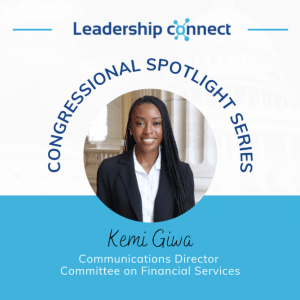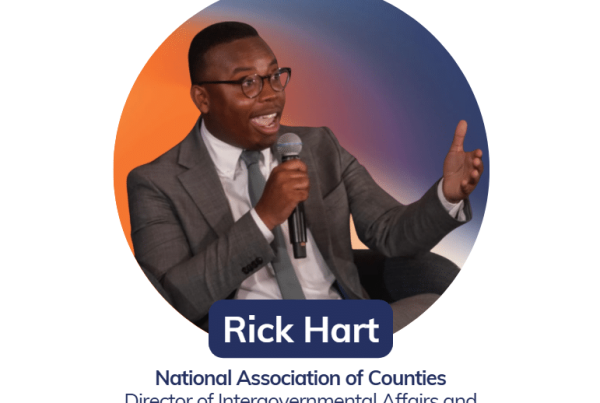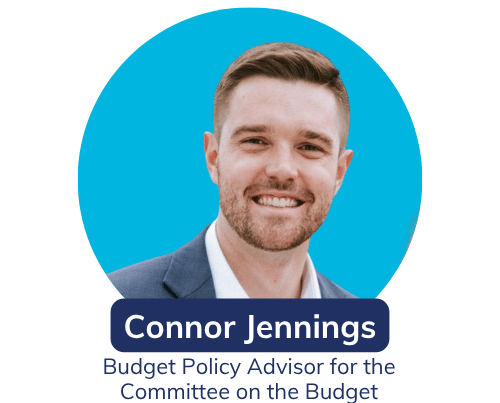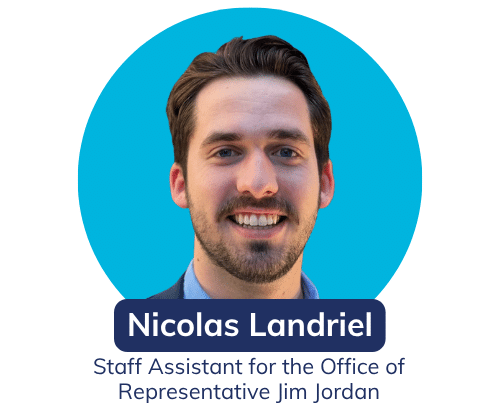Shaping the Narrative on Capitol Hill

This week, we spoke to Kemi Giwa, Communications Director for the Committee on Financial Services.
Can you outline your career journey and the key steps that led you to your current role as a Communications Director?
My passion for news and storytelling started early in my childhood. Every morning, my dad would have my brothers and me read the physical copies of the local paper alongside pages from The New York Times and The Washington Post, followed by a summary of what we read. We watched national news for fun in high school, and as a result, I grew up with a deep admiration for women like Melissa Harris-Perry, Rachel Maddow, and Soledad O’Brien, particularly for their special ability to draw audiences in and tell stories that moved people to act.
While I knew journalism wasn’t the right path for me, I was drawn to a career that would allow me to uplift important stories. Including the ones that don’t always make the news. Stories and people who are often overlooked. Stories that don’t make it on the front page. Even those that are consequential but too technical or complex for the average person to easily grasp. I wanted to elevate those stories to advance commonsense policy, support organizations doing meaningful work, and collaborate with the very journalists I’d admired, all toward our shared goal of helping people better understand the world around them.
While in college, I was an active member of the Public Relations Student Society of America and held multiple political communications internships, including with the California State Assembly and the Mayor of San Diego. Through these opportunities, I saw an avenue to channel my passion.
Soon after graduating, I moved to Washington, D.C., and worked at a public relations firm where I helped lead communications efforts for organizations advocating for urgently needed legislation, launched public education campaigns, and supported clients in their efforts to define and amplify their brand.
These experiences ultimately led me to Capitol Hill, where I served as Press Secretary for a member of the Massachusetts delegation, before becoming Deputy Communications Director and, later, Communications Director for the House Financial Services Committee.
Which policy areas or legislative issues are you most passionate about within the committee’s scope, and how do you stay informed and engaged in those specific areas?
I’m especially passionate about legislative issues surrounding our nation’s financial institutions, including banking and regulatory policy. There’s no question that the banking system touches the lives of every single American. It impacts people’s wallets, greatly influences the broader economy, and shapes financial opportunity. That’s why ensuring this system works better for everyone is, in my view, one of the most important priorities within the Committee’s jurisdiction.
As a Gen Z staffer with deep roots in Silicon Valley, encouraging innovation in the financial services system is also a major focus of mine. Whether through cryptocurrency, which is rapidly entering the financial services mainstream, or artificial intelligence, which is poised to transform how the financial services system operates, I’m both personally and professionally invested in how policymakers can responsibly communicate around these issues and embrace these innovations.
My favorite way to stay up to date on developments in these areas is to absorb as much news as possible. The first thing I do every morning is scroll through the tip sheets and dive into the news of the day. My daily non-negotiables are The Wall Street Journal, Bloomberg, CNBC, and The New York Times. I like to end my days reading CNN’s Business newsletter and Bloomberg’s Money Stuff. I’m also a massive podcast junkie. Banking with Interest, Planet Money, Odd Lots, and Big Take are just a few that help me stay informed and deepen my understanding of these issues. As a communicator, my job is to understand the substance so I can break through the weedy, policy jargon and make sure Members are communicating in a way that would be easily understood by someone outside of the financial services bubble.
I also enjoy media-specific podcasts that break down the state of journalism and the broader media landscape. Puck’s The Grill Room or Semafor Mixed Signals. Ultimately, to do this job well, we have to understand the media environment we’re operating in.
Can you describe a challenging or rewarding project you’ve worked on as a committee staffer that significantly impacted your professional growth? How did you navigate the challenges, and what did you learn from the experience?
There are far too many projects to count. I’ve been in the trenches during some of the most pivotal moments in the financial services space. These are moments that demanded swift and effective communications strategy to calm markets, reassure consumers and investors, and/or help stabilize the economy. These high-pressure situations refined my instincts, while teaching me to be scrappy, more resourceful, and approach communications with greater creativity and adaptability. Some of my most valuable professional growth has come from navigating these high-stakes moments.
In your role as Communications Director, effective leadership is essential for keeping the team aligned with messaging and communication goals. What strategies or techniques do you use to inspire and motivate your team, ensuring they remain focused on delivering the committees’ objectives despite any obstacles?
One of my top priorities is creating an environment where the team feels empowered to share new ideas. Especially in today’s rapidly evolving new media landscape, where some of the most effective communication strategies often break from the status quo and lean into creative and outside-of-the-box approaches. Giving my team the autonomy to pitch bold ideas and see them through not only keeps the work exciting but also boosts morale and helps us discover new, innovative ways to meet the Committee’s objectives.
In your view, what sets working on a congressional committee apart as a unique experience on Capitol Hill, and how do you navigate the specific challenges that come with it in your daily work?
Having worked in a personal office before joining the Committee, I can say both are wonderful and incredibly rewarding experiences, but Committee life is truly unique. It has given me the ability to develop a niche, carve out a lane for myself, and dive deep into specific policy areas far beyond the surface level.
What also sets Committee work apart is the scope of responsibility. I don’t just serve the Chair or Ranking Member (depending on who holds the majority), I serve every member on our side of the Committee. As Communications Director, that means developing messaging that is useful, adaptable, and effective for the dozens of members on our side, each of whom represent diverse perspectives and distinct constituencies.
The challenge lies in crafting unified messaging that speaks to that broad coalition. The solution I’ve found, as the saying goes, is to “keep the main thing the main thing.” At the end of the day, families in every community across the country are focused on the economy, putting food on the table, keeping a roof over their heads, and making ends meet. My messaging goal is to elevate what matters most to people and highlight how the Committee is working relentlessly to deliver results so families aren’t simply just making it by, but getting ahead.
This messaging framework cuts across geography and ideology, hopefully making it a useful tool for all members.
Word association, what is the first word that comes to mind for each of these?
Policy – Action
Networking – Mandatory
Writing Skills – Non-negotiable
Working on the Hill – Rewarding
Leadership Connect – Meaningful






